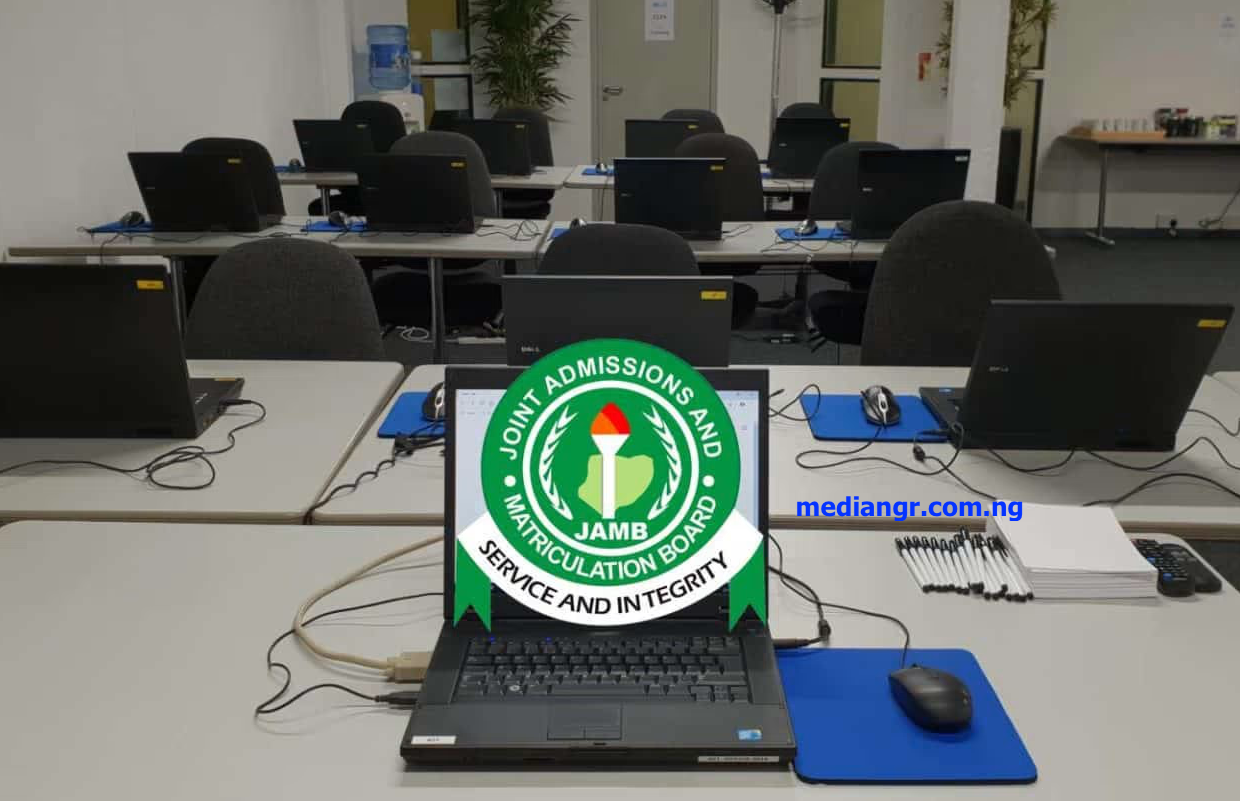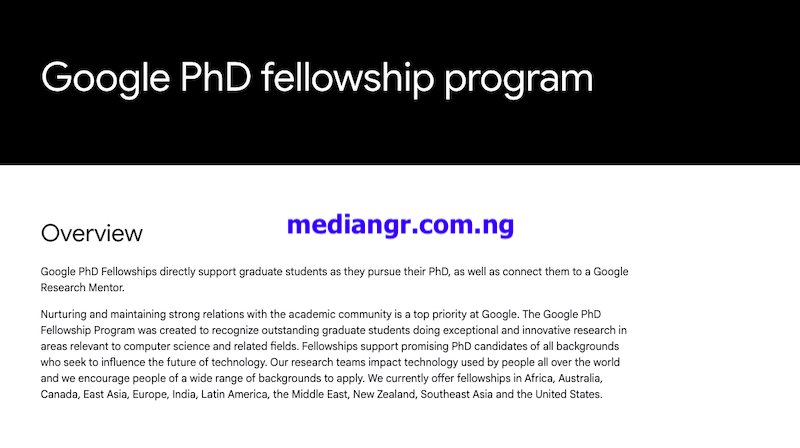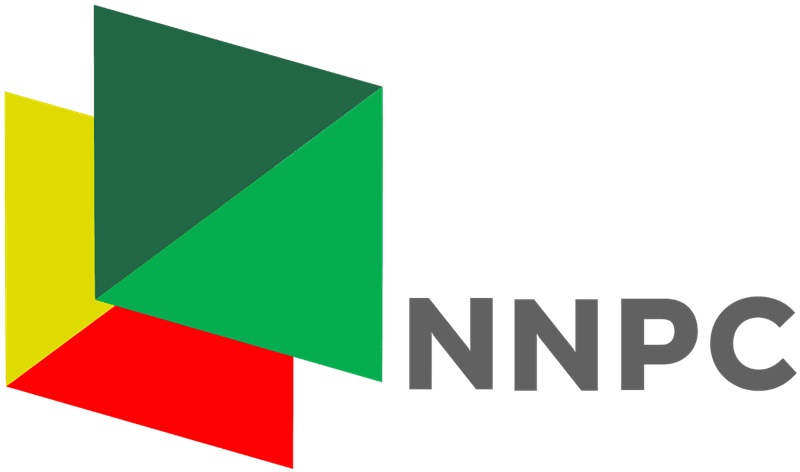Apply for the prestigious Google PhD Fellowship Program 2025 and receive financial support, global recognition, and mentorship from Google researchers. Open to PhD students worldwide in computer science and related fields.
If you’re a PhD student making strides in computer science or a related discipline, the Google PhD Fellowship Program 2025 is your gateway to innovation, recognition, and invaluable support. Designed to empower the next generation of exceptional researchers, the fellowship is not just about funding—it’s about becoming a part of a global network of elite thinkers and innovators.
From cutting-edge mentorship by top Google scientists to financial support that spans years, this program offers more than just a scholarship—it’s an accelerator for your academic journey. Open to candidates across Africa, Europe, the Americas, Asia, and Oceania, the program seeks PhD scholars with the vision to push the boundaries of technology and solve some of the world’s most complex problems.
In this post, we break down everything you need to know—from eligibility and benefits to the application timeline and research focus areas.
Overview of the Google PhD Fellowship 2025
| Feature | Details |
|---|---|
| Fellowship Name | Google PhD Fellowship Program 2025 |
| Eligible Regions | Africa, Australia, Canada, East Asia, Europe, India, Latin America, Middle East, New Zealand, Southeast Asia, United States |
| Eligible Fields | Computer Science and related disciplines |
| Fellowship Duration | Varies by region (1 to 4 years) |
| Application Open Date | April 10, 2025 |
| Application Deadline | May 15, 2025, 11:59:59 PM AoE (UTC-12) |
| Notification of Results | August 31, 2025 |
| Official Website | https://research.google/programs-and-events/phd-fellowship/ |
What’s at Stake – Fellowship Benefits by Region
One of the major attractions of the Google PhD Fellowship is the comprehensive support it offers, tailored to each region’s academic and financial environment. Here’s a breakdown of the fellowship benefits:
| Region | Duration | Support Provided |
|---|---|---|
| Africa | Up to 3 years | $12,000 per year + mentorship from a Google Researcher |
| Australia & NZ | 1 year | AUD $20,000 |
| Canada & U.S. | Up to 2 years | $85,000/year ($70K tuition & fees, $15K stipend) |
| East Asia | 1 year | $10,000 |
| Europe & Middle East | Up to 2 years | Tuition, stipend, salary, healthcare, travel, equipment |
| India | Up to 4 years | $50,000 for early-stage; $10,000 for late-stage students |
| Latin America | Up to 2 years | $15,000 per year |
| Southeast Asia | Up to 3 years | $10,000 per year |
These benefits include financial assistance for tuition, living expenses, and direct mentorship from experienced researchers at Google, making it a holistic program aimed at nurturing academic and practical excellence.
Eligibility Criteria
Before applying, ensure that you meet the specific eligibility criteria set for your region. Here’s an overview:
General Eligibility (All Regions):
- Must be enrolled full-time in a PhD program during the fellowship.
- Must not be a Google employee or related to a Google employee.
- Cannot be a recipient of another industry-sponsored fellowship (except government or non-profit funding).
Regional Eligibility Details:
| Region | Eligibility |
|---|---|
| Africa, India, Latin America, Southeast Asia | Open to incoming or early-stage PhD students |
| Australia & New Zealand | Open to PhD students in their first or second year |
| Canada & U.S. | Open to students who have completed their coursework |
| East Asia | Open to students who have finished most of their graduate coursework |
| Europe & Middle East | Open to all PhD stages |
To increase your chances of selection, you must demonstrate a strong academic track record, leadership potential, and a deep commitment to impactful research.
Research Domains Covered
The fellowship supports research in key areas that are shaping the future of computing and digital technology. Applicants are expected to submit a research proposal aligned with any of the following focus areas:
🔹 Machine Learning and Foundations of ML
🔹 Algorithms and Optimization
🔹 Quantum Computing
🔹 Systems, Networking, and Cloud Computing
🔹 Human-Computer Interaction
🔹 Privacy, Safety, and Security
🔹 Health Research
🔹 Natural Language Processing (NLP)
🔹 Software Engineering and Programming Languages
🔹 Computer Architecture
🔹 Machine Perception (e.g., computer vision)
Applicants whose research falls within these areas and shows potential for real-world impact will stand out during the review process.
Why Apply for the Google PhD Fellowship 2025?
If you are serious about pioneering solutions in technology and want to collaborate with some of the world’s top researchers, this fellowship opens doors that traditional funding cannot:
✔ Global recognition in academic and research communities.
✔ Mentorship from leading minds at Google.
✔ Financial stability, allowing you to focus entirely on your research.
✔ Access to Google’s research ecosystem, including tools, datasets, and networking events.
✔ Career opportunities through visibility within the Google research network.
This is more than a financial award—it’s a career-transforming opportunity.
How to Apply for the Google PhD Fellowship Program 2025
Ready to take the leap? Here’s a simple breakdown of the application process:
Step 1: Review Eligibility and Prepare Documents
Ensure you meet the regional eligibility criteria. Start gathering your:
- Updated CV
- Academic transcripts
- Research proposal (detailing your PhD work and future research goals)
- Letters of recommendation (usually from advisors or faculty members)
- Personal statement (highlighting your achievements and motivation)
The details of each Fellowship vary by region. Please see the FAQ for eligibility requirements and application instructions.
Step 2: Apply Online
Visit the official Google PhD Fellowship Portal (https://research.google/programs-and-events/phd-fellowship/) to begin your application. Follow all submission guidelines strictly, including file formats and word limits.
NOTE: PhD students from Africa, Australia, Canada, East Asia, Europe, India, Latin America, the Middle East, New Zealand, Southeast Asia and the United States, must be nominated for the fellowship by their university. Applications must be submitted by an official representative of the university during the application window. Please contact your department or graduate school for more information on the internal nomination process.
Step 3: Submit Before Deadline
All applications must be submitted by May 15, 2025 at 11:59:59 PM AoE (UTC-12). Late submissions will not be considered.
Timeline for the 2025 Fellowship Cycle
| Date | Event |
|---|---|
| April 10, 2025 | Applications open |
| May 15, 2025 | Application deadline |
| August 31, 2025 | Notification of results |
| October 31, 2025 | Announcement of 2025 Google Fellows |
🔬 Google PhD Fellowship Program Research Areas of Focus
Google PhD Fellowship students are among the most promising academics in the world, recognized for their innovative contributions to computer science and related disciplines. The program seeks bold, impactful research across a wide range of topics. While some regions may have specific focus areas, the following domains represent Google’s current research priorities:
🧠 Computer Architecture
Google encourages proposals that rethink traditional computing structures. From processor design to AI-driven circuit modeling, research in this area should demonstrate creative solutions, bold hypotheses, and a deep understanding of system architecture challenges.
📐 Algorithms and Optimization
This foundational area includes the development of efficient methods to solve complex computational problems. Google is particularly interested in:
- Combinatorial optimization
- Market algorithms
- Operations research
- Continuous optimization and learning
- Scalable algorithms
These tools support better ML models and smarter problem-solving across industries.
🏥 Health Research
Google’s Health Research aims to transform global healthcare with AI-driven insights. Proposals may explore:
- Large datasets for population health insights
- Algorithms for analyzing complex medical data (images, genomics, lab tests)
- Cost-effective methods (software/hardware) for generating health insights
The focus is on under-resourced communities and making health innovation more accessible.
🖥️ Human-Computer Interaction (HCI)
The future of HCI lies at the intersection of human needs and emerging technology. Google seeks research that explores:
- Human-AI collaboration
- Responsible and ethical AI
- Accessibility-enhancing interfaces
- Interactive machine learning and XR
Submissions should emphasize predictive UIs, mobile computing, and innovative social computing paradigms.
🤖 Machine Learning and ML Foundations
Machine learning remains a core research focus for Google. Proposals are welcomed in:
- Learning theory and algorithms
- Federated learning
- Optimization for ML
- Recommender systems
- Robotics and reinforcement learning
This research helps Google stay at the forefront of scalable and ethical ML solutions.
👁️ Machine Perception
Machine Perception involves developing systems that interpret audio, image, video, and sensory data. Topics of interest include:
- Speech and action recognition
- Perceptual similarity measures
- Neural & classical compression techniques
- Digital media processing
- Generative models for video/image creation
🗣️ Natural Language Processing (NLP)
NLP is vital to Google’s mission of organizing the world’s information. Research areas include:
- Text generation and summarization
- Multilinguality and translation
- Question answering systems
- Information retrieval
- Dialogue and multimodality
The aim is to make Google products more helpful and inclusive.
🔐 Privacy, Safety, and Security
Google prioritizes user safety across all platforms. Proposals should focus on:
- AI for privacy, security, and safety
- Differential privacy and cryptography
- AI system vulnerabilities
- Hardware/software security
- Secure supply chains and side-channel analysis
All projects should align with Google’s goal of a safer web.
⚛️ Quantum Computing
This futuristic field is centered on building fault-tolerant quantum systems and real-world applications. Relevant topics include:
- Quantum algorithms and error correction
- NISQ experiments
- Superconducting qubits
- Classical simulation of quantum systems
💻 Software Engineering and Programming Languages
Google welcomes proposals that improve software quality, usability, and scalability. Topics include:
- Testing tools and debugging strategies
- Language design and implementation
- Developer cooperation and code optimization
- Software verification and performance tuning
🌐 Systems, Networking, and Cloud Computing
This area explores infrastructure at a global scale, from firmware to ML environments. Submissions may address:
- Operating systems and kernels
- Global storage and orchestration
- Custom processors and accelerators
- Networking protocols and cloud architecture
🔎 Note: Region-specific research focus areas will be listed in the official application forms during the application period. Applicants are encouraged to align their proposals accordingly.
📋 Review Criteria
Applicants to the Google PhD Fellowship 2025 will be evaluated based on four key pillars that reflect both academic merit and the potential for long-term impact. A successful application should exhibit excellence in the following areas:
🧪 1. Strength of Research Proposal
Google looks for:
- Originality and innovation
- Relevance to Google’s research interests
- A clear problem statement with achievable goals
- Robust methodology
- Anticipated outcomes and their significance to the field
Make sure to outline the direction your work is heading, not just what you’ve already done.
🌍 2. Research Impact
The proposed research should have the potential to:
- Advance the field of computer science
- Address pressing challenges
- Introduce new methodologies or frameworks
- Inspire future academic or industry research
🎓 3. Academic Achievement
A strong academic track record is essential. Google considers:
- Course performance and GPA
- Previous research experience and publications
- Awards and honors
- Institutional prestige and research environment
🌟 4. Leadership Potential
Beyond academics, Google values leadership qualities that signal future contributions to the research community. These may include:
- Mentorship roles
- Public engagement or outreach
- Initiative in cross-disciplinary collaboration
- Unique contributions to lab or institutional progress
✍️ Note for applicants in Canada, U.S., East Asia, and Latin America: Essay responses will be critically reviewed alongside your application materials. These essays play a major role in the overall recommendation process.
Final Thoughts
The Google PhD Fellowship Program 2025 is your chance to amplify your research, gain global exposure, and become part of a vibrant community of tech innovators. Whether you’re just starting your PhD or advancing through your research, this opportunity can transform your career trajectory.
If you believe your work can shape the future of technology, this is your stage—apply before May 15, 2025, and unlock a world of possibilities with Google Research.





